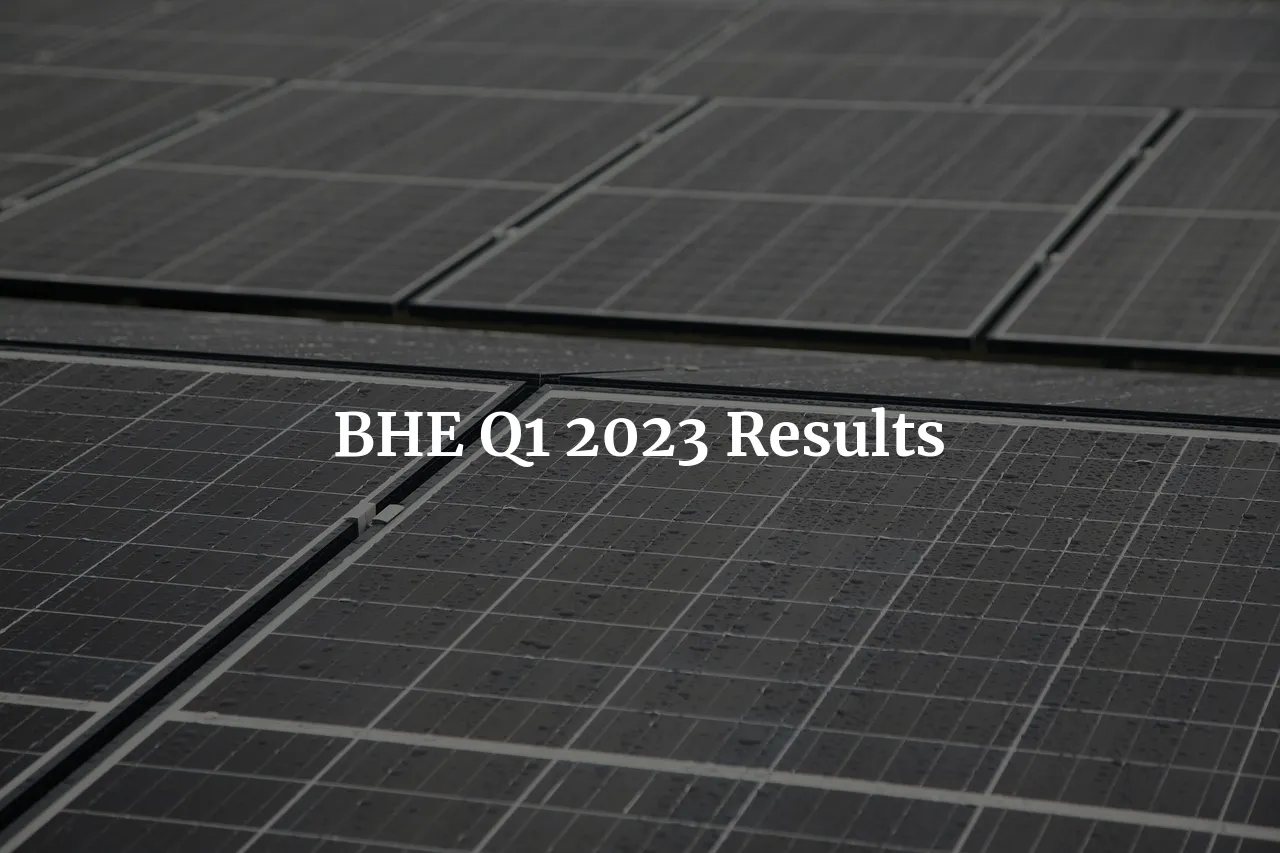Tags: BHE / earnings
This fanpage is not officially affiliated with Berkshire Hathaway: Disclaimer
Berkshire Hathaway Energy's Q1 2023 results showed a substantial income tax benefit, boosting net earnings, but also a 46.2% decrease in earnings compared to Q1 2022. The decline can be attributed to lower after-tax earnings from US utilities, other energy businesses, and the real estate brokerage business. Shareholders of Berkshire Hathaway should consider the long-term implications of these results and the company's ability to navigate the evolving regulatory environment and capitalize on emerging opportunities in the energy sector.

Introduction
Berkshire Hathaway Energy (BHE) is a global energy business operating in various sectors, including domestic regulated utility interests, natural gas pipelines, renewable independent power projects, and investments. BHE also operates two regulated electricity distribution businesses in Great Britain and a regulated electricity transmission-only business in Alberta, Canada. In addition to its energy operations, BHE runs a residential real estate brokerage business and a large network of real estate brokerage franchises in the United States. The company's Q1 2023 results are of significant importance to shareholders of Berkshire Hathaway, as they provide insights into the company's financial performance and future outlook. This article will analyze BHE's Q1 2023 results, focusing on tax benefits and decreasing earnings.
Revenues and Operating Revenue Breakdown
In Q1 2023, BHE reported total revenues of $6,451 million. The company's energy operating revenue accounted for the majority of this figure, totaling $5,471 million. BHE's real estate operating revenue stood at $875 million. These figures indicate that the company's energy business continues to be its primary revenue driver, while the real estate segment plays a secondary role.
BHE's energy operating revenue is derived from various sources, including its domestic regulated utility interests and natural gas pipelines. The company also has a diversified portfolio of mostly renewable independent power projects and investments, as well as an unregulated retail energy services company. The rates BHE's regulated businesses charge customers for energy and services are subject to regulatory approval and based on the costs of business operations, including income taxes and a return on capital. This means that the company's revenues are heavily influenced by the regulatory environment, as well as market forces and technological advancements in the energy sector.
Pre-Tax and Net Earnings
BHE reported pre-tax earnings of $223 million in Q1 2023. However, the company's net earnings attributable to BHE were significantly higher, totaling $472 million. This discrepancy can be attributed to the income tax benefit that BHE received during the quarter. It is important to note that BHE's operating results are based on after-tax earnings, which makes the comparison of net earnings to previous periods more relevant for assessing the company's performance.
When comparing BHE's Q1 2023 net earnings to Q1 2022, there is a noticeable decrease of 46.2%. This decline in earnings can be attributed to various factors, including lower after-tax earnings from the company's U.S. utilities, other energy businesses, and real estate brokerage business. In the following sections, we will delve deeper into the performance of each of these segments to better understand the reasons behind the decrease in BHE's net earnings.
Income Tax Benefit and Effective Income Tax Rate
In Q1 2023, BHE reported an income tax expense that was actually a benefit of $363 million. This tax benefit played a crucial role in boosting the company's net earnings for the quarter. The effective income tax rate for BHE in Q1 2023 was (162.8)%, which indicates that the company received a substantial tax benefit during this period.
The tax benefit can be attributed to various factors, including changes in tax laws, regulatory adjustments, and the company's ability to utilize tax credits and deductions. While the tax benefit has a positive impact on BHE's net earnings, it is essential for shareholders to consider the sustainability of such benefits in the long term. The company's future tax liabilities will depend on the evolving regulatory environment and its ability to continue utilizing tax credits and deductions effectively.
Regulated Utility Interests and Natural Gas Pipelines
BHE's U.S. utilities reported a decrease in after-tax earnings of $237 million in Q1 2023 compared to Q1 2022. Despite this decline, the electric utility margin for U.S. utilities increased by 3.8% to $1.7 billion during the same period. Retail customer volumes also increased by 2.6% in Q1 2023 compared to Q1 2022. These figures suggest that while the overall earnings from U.S. utilities decreased, there were some positive developments in terms of utility margins and customer volumes.
On the other hand, BHE's natural gas pipelines segment reported an increase in after-tax earnings of $47 million in Q1 2023 compared to Q1 2022 ↗. This improvement can be attributed to factors such as higher throughput volumes, increased transportation rates, and cost management initiatives. The performance of BHE's natural gas pipelines segment highlights the importance of diversification in the company's energy operations, as it helps to offset the challenges faced by other segments.
Renewable Independent Power Projects and Investments
BHE's other energy businesses, which include a diversified portfolio of mostly renewable independent power projects and investments, reported a decrease in after-tax earnings of $156 million in Q1 2023 compared to Q1 2022. This decline can be attributed to various factors, including lower energy production from renewable sources, reduced capacity payments, and increased operating expenses.
The performance of BHE's renewable independent power projects and investments is subject to fluctuations in energy production, market prices, and regulatory policies. As the global energy landscape continues to evolve, with a growing emphasis on renewable energy sources, BHE's ability to adapt and capitalize on emerging opportunities in this sector will be crucial for its long-term success.
Real Estate Brokerage Business
BHE's real estate brokerage business reported a decrease in after-tax earnings of $55 million in Q1 2023 compared to Q1 2022. This decline can be attributed to factors such as lower transaction volumes, increased competition, and higher operating expenses. The real estate brokerage business operates in a highly competitive and cyclical industry, which makes it susceptible to fluctuations in market conditions and consumer preferences.
Despite the challenges faced by BHE's real estate brokerage business, it remains an important component of the company's overall operations. The real estate segment provides diversification benefits and has the potential to generate significant returns during periods of strong market performance.
Conclusion for Shareholders of Berkshire Hathaway
BHE's Q1 2023 results tell a tale of tax benefits and decreasing earnings. While the company benefited from a substantial tax benefit, its net earnings decreased by 46.2% compared to Q1 2022 ↗ . This decline can be attributed to lower after-tax earnings from U.S. utilities, other energy businesses, and the real estate brokerage business.
For shareholders of Berkshire Hathaway, it is essential to consider the long-term implications of these results. BHE's future performance will depend on its ability to navigate the evolving regulatory environment, capitalize on emerging opportunities in the energy sector ↗ and effectively manage its diverse portfolio of businesses. While the Q1 2023 results may raise concerns, it is crucial to remember that the company operates in dynamic industries that are subject to fluctuations in market conditions and external factors. As such, shareholders should maintain a long-term perspective when evaluating BHE's financial performance and future outlook.
References
- www.berkshirehathaway.com: First Quarter 2023












